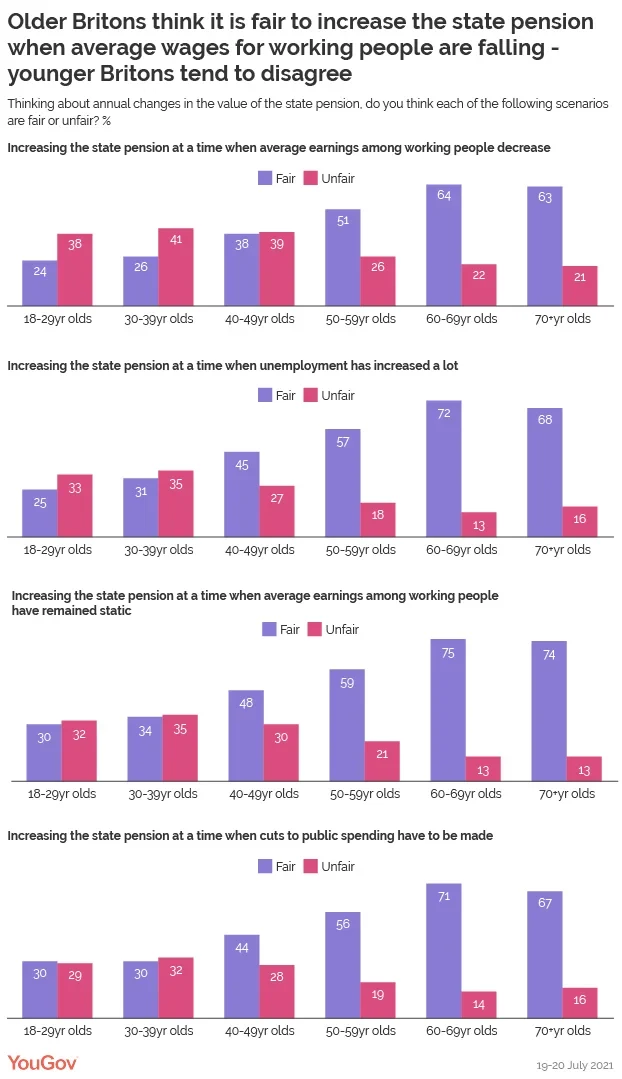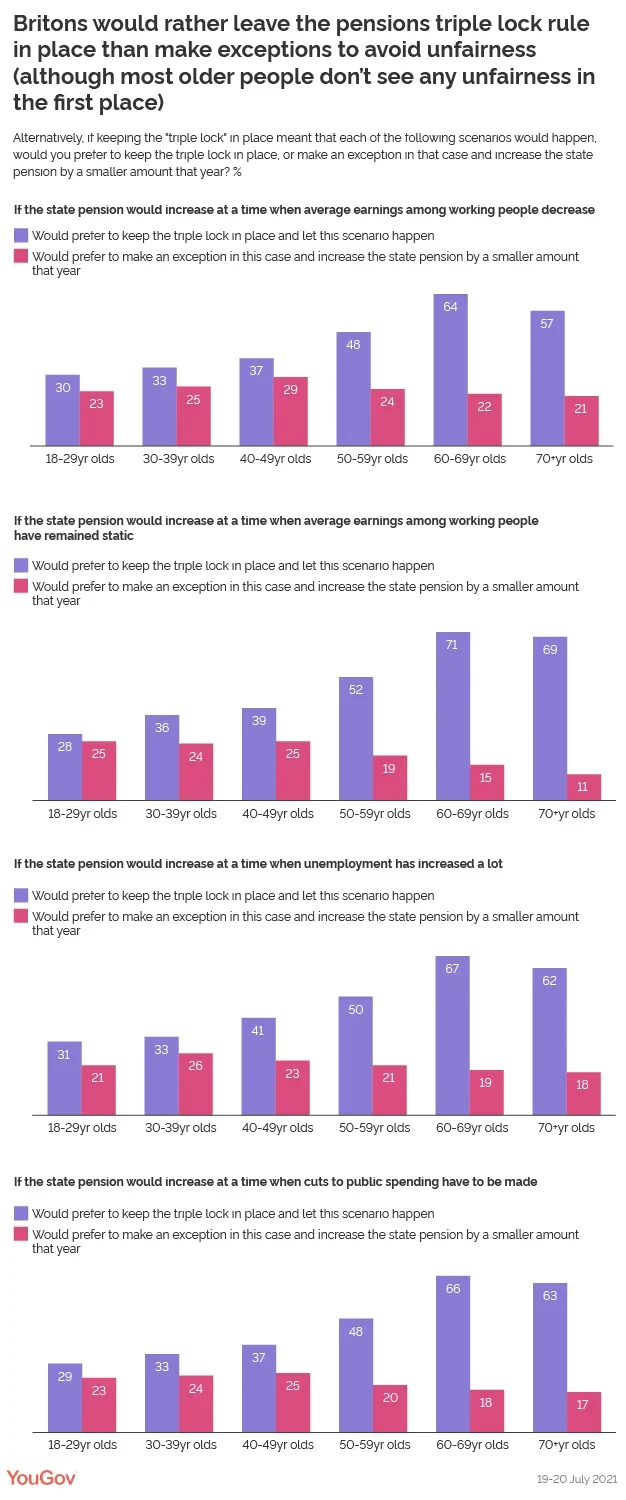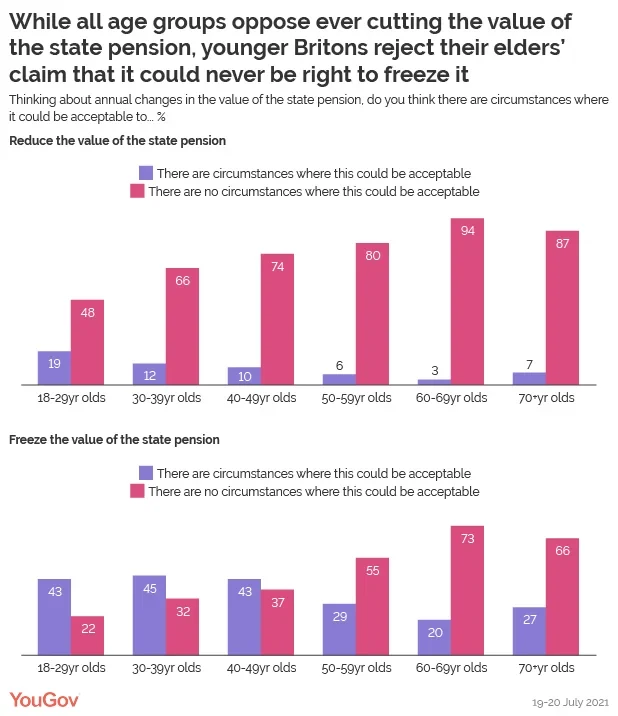There are huge generational differences between young and old on fairness and the pension system
The pensions triple lock rule was introduced in 2011 by the coalition government. The rule states that the value of the state pension must rise each year in line with the highest of three possible figures: how much the average price of goods and services have risen nationally; how much average earnings have risen nationally; or by 2.5%.
The goal of the policy is to keep the standard of living among state pensioners rising in tandem with the rest of society. But because of quirks in the rules, some are now calling for the triple lock to be modified or abandoned.
Given a brief description of what the triple lock is (see chart), the public strongly wants to keep it in place. Two thirds (68%) support maintaining the rule, compared to just 11% who want to scrap it.
The policy as described is popular across all of society, garnering the support of the youngest Britons (18-29 year olds want to keep it by 53% to 12%) and the non-retired population (by 63% to 13%). Unsurprisingly the retired are its biggest fans, with 85% wanting to keep the triple lock.
The generations differ on whether it is fair for the state pension to go up while workers are struggling
Of course, the triple lock sounds perfectly nice when described in isolation. But there are times when quirks in the way the rules work bring up a question of fairness. The coronavirus pandemic is such a time.
Because so many low-paid workers lost their jobs during the pandemic, this means that the average wage value in Britain has artificially risen; not as a result of people’s wages going up, but as a result of those on lower wages dropping out of the calculation.
Consequently, the state pension is set to rise by 8% this year – because the triple lock requires that it rise by the highest out of prices, wages, or by 2.5% – which many consider unfair at a time when many working people have lost their jobs or not seen their wages increase.
So we wanted to test where Britons stand on potential unfairness in the way the triple lock can work. We asked people how fair it would be for the state pension to increase in various negative scenarios.
The results show a huge divide between young and old, working and retired.
Asked whether it would be fair to raise the value of the state pension at a time when average earnings among working people are falling, retired Britons think this is a fair situation by 61% to 24%. Non-retired Britons are more split, with 37% seeing it as fair and 36% as unfair.
Age is the key dividing line. While 63-64% of those aged 60 and above consider it fair, this falls to just 24-26% of the under-40s.

Younger Britons also tend to think it is unfair to increase the state pension during times of rapidly increasing unemployment, and are split on the fairness of boosting pensions when wages are stagnant or public spending cuts need to be made.
In all three of these examples, those aged 40 and over are much more likely to see them as fair than unfair. The same goes for both retired and non-retired Britons as a whole.
Britons – including younger people – don’t see unfairness as a reason to not follow the triple lock rules
We then tied these negative scenarios directly to the triple lock, and asked Britons whether they would prefer to keep the triple lock in place and allow them to happen, or suspend or scrap the pensions rule in order to prevent them.
Despite having previously identified the scenarios as unfair, many under-40s baulk at amending the triple lock in order to stop them coming to pass.
For instance, in the event that the state pension would increase at a time when average earnings were falling, by 30% to 23%, 18-29 year olds would rather keep the triple lock than make an exception and only give pensioners a smaller increase that year. Among people in their thirties those figures are 33% and 25% respectively.

When combining the responses on the fairness question with what they would do about it in reality, we see that about a third of those young people who think each scenario is unfair nevertheless wish to keep the triple lock in place.
These switchers are enough to put the ‘keep the triple lock’ side slightly higher than the ‘make an exception in this case’ side in all scenarios among young people. Among older people the preference across all scenarios is strongly in favour of keeping the triple lock in place.
Sentiment in favour of keeping the triple lock in place is even stronger among all groups when our survey posed the choice between keeping the triple lock or scrapping it entirely to avoid unfairness.
It is also worth noting that huge numbers of young people answered “don’t know” on questions of fairness (31-43%) and what to do in the various scenarios (39-49%), while older Britons are much more likely to have an opinion.
Can it ever be right to freeze or decrease the value of the state pension?
While thinking it perfectly fair for workers to fund their pension increases at a time when their own wages are falling, pensioners reject the notion that they too could be asked to sacrifice their income.
Nine in ten retired Britons (91%) say there are no circumstances where it could be acceptable to reduce the value of the state pension, and 71% say the same about freezing it.
Other Britons tend to agree when it comes to cutting pensions, but aren’t so sure that there is no case for ever freezing them. Non-retired Britons are split, with 40% saying they can see that it might be right to fix the value of state pensions for a period versus 38% who reject this possibility.
Four in ten Britons under the age of 50 (43-45%) likewise say there is a case to be made for freezing the state pension on occasion. Among 18-29 year olds this is twice as many as think maintaining the state pension at a certain rate unconscionable (22%).

See full results here








